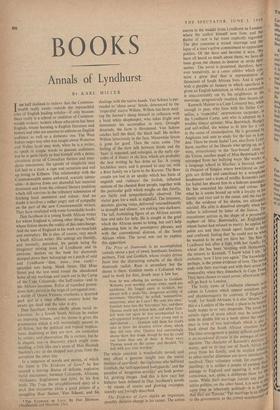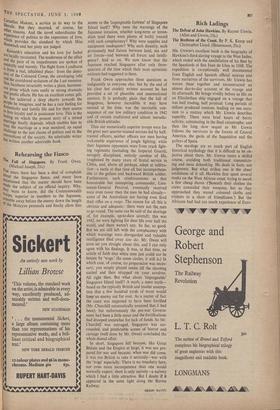BOOKS
Annals of Lyndhurst
BY KARL MILLER y AM half inclined to believe that the Common- ' wealth really exists—outside the reproachful cries of English leading articles—if only because there really is a school or coalition of Common- wealth Writers: writers whose education has been English, whose learning is English literature and history and who are anxious to address an English audience as well as a domestic one. The West Indian negro boy who was taught about Waterloo and Walter Scott may wish, when he is a writer, to speak in simple words to peasant audiences, but he is quite likely to find himself with a dense, circuitous prose of Conradian themes and man- darin remoteness; the apostle of simplicity may fall heir to a stick, a cape and carnation and end up living in Kilburn. This relationship with the Commonwealth seems awkward, scarcely admis- sible—it derives from our shameful late material dominion and from the colonial literary tradition which still survives in the tributary submission of fetching local sentiment and colour. And no doubt it involves a rather angry sort of sympathy on the part of the new Commonwealth writers. They have retaliated with some formidable books.
Dan Jacobson is a young South African writer for whom England is, among other things, `truth,' whose fiction shows the reality of this interchange. And the uses of England in his work are manifold and exemplary. He is also, of course, very much a South African writer. His settings are literally, and intensely, parochial, his parish being the imaginary mining town of Lyndhurst and its environs. Settlers on the hunt for diamonds dumped down their belongings on a patch of veld and Lyndhurst—`dust, trees, iron roofs'— sprawled into being. Muck. Street, Old Mine Street and the rest wind round the abandoned holes of old workings and reach out to the Camp of the Cape. Coloureds--the half-castes—and to the African locations. Relics of vanished preten- sions sadly persist in the reign of corrugated iron : a statue of Queen Victoria overlooks a deserted park and at a once affluent country hotel the swans are dead and the lake is dry.
Dan Jacobson writes chiefly about racial in- tolerance. As a Jewish South African he makes an imposing witness, and the theme is given the prominence which it will increasingly assume in all fiction, but the political and topical implica- tions, deafening as they are now, are controlled by artistry and observation. He is earnest, but he is elegant, too --a discovery which might seem startling, a little like one's sense of Miss Hannah Stanton's chic as she stepped non grata from the aeroplane the other day.
In a sequence of novels and stories, of which the latest is The Evidence of Love,* he has created a moving drama of delicate, explosive
racial encounters, between Coloureds, Africans, Afrikaners, Englishmen and Jews. In his first book, The Trap, the straightforward story of a trick that miscarries yields a good picture of a struggling Boer farmer, Van Schoor, and his *DIE EVIDENCE • OF Lovr.. By Dan Weobson. Weidenfeld and Nicolson, 15s.) dealings with the native hands. Van Schoor is per- suaded to `chase away' Setole, denounced by the
`respectful' native Willem. Willem has been steal- ing the farmer's sheep himself in collusion with a local white shopkeeper, who takes fright and denounces his accomplice in turn. Drought descends, the farm is threatened. Van Schoor catches half the thief, the black half. He strikes Willem laboriously in the face. Meanwhile Setole is gone for good. Then the rains come. The feeling of the slow talk between Setole and the `baas' is repeated, and enlarged, in the early epi- sodes of A Dance in the Sun, which are probably the best writing he has done so far. A young hitchhiker stays, and is pressed to stay on, with a Boer family on a farm in the Karroo. The Boer couple are lost in an apathy which has hints of anguish and violence; the foolish, inflamed notions of the cheated Boer people, together with the particular guilt which weighs on this family, are fairly and sympathetically observed. The visitor goes for a walk at nightfall. The immense, desolate, glaring vistas, delivered 'unconditionally to drought and silence,' are sinking into darkness.
The tall, forbidding figure of an African accosts him and asks for help. He is caught in the grief which the African seems to bring, but can't help addressing him in the peremptory phrases, and with the conventional distrust, of the South African white. The novel sets out to explain this apparition.
The Price of. Diamonds is an accomplished comedy about a pair of sweet, bombastic business partners, Fink and Gottlieb, whose rivalry drives them into the distracting suburbs of the illicit diamonds racket. Race is secondary but the theme is there. Gottlieb meets a Coloured who used to work for him, drunk near a low bar.
Now he was offering his services to Gottlieb. 'Reliable, your worship, always sober,,much too
ambitious.' He lunged again at Gottlieb, but always with a snake-like, dangerous servility of movement. 'Overtime,' he yelled, 'summertime,
wintertime, what do I care? We only live once.' Gottlieb went into the 'European' bar, and there Thomas could not follow him; and when Gott- lieb went out again he was accompanied by a self-appointed bodyguard of two young men in shirt-sleeves. . . . Gottlieb told them for God's sake to leave the drunken fellow alone, which they did only after Thomas had convincingly shown them that drunk though he was he could run faster than any of them. A block away Thomas stood on the corner and shouted, 'To hell with you your worship.'
The whole anecdote is wonderfully turned, and may afford a genuine insight into the social realities of apartheid: the vigilantes who befriend Gottlieb, the 'self-appointed bodyguards,' and the paradox of 'dangerous servility' are both power- ful, glowing images. And this is how race has hitherto been debated in Dan Jacobson's novels —by means of stories and glowing examples, intently and lovingly described.
The Evidence of Love marks an important, possibly deeisive change in his career. The action
moves in the middle from Lyndhurst to London, where the author himself now lives, and the theme of race is far more explicitly regarded. The plot concerns a mixed marriage and the lapse of a man's active commitment to opposition politics. Of the hero and heroine it says, 'We have all heard so much about them; we have all been given the chance to honour or revile their names.' The novel is presented, therefore, how' ever tentatively, as a cause célèbre which con- tains a great deal that is representative of thousands of South African lives. And it opens with a parable or fantasy in which apartheid is given an English habitation, in which a commuter is unaccountably cut by his neighbours in the mornings, progressively insulted, then beaten uP.
Kenneth Makeer is a Cape Coloured boy, white enough to pass, who lives with his father Cor' nelius, a 'respectful,' ceremonious carpenter. in the Lyndhurst Camp, and who is adopted by a wealthy liberal spinster, Miss Bentwisch. Hungry and self-willed, she wishes to fit him for a role in the cause of emancipation. He is groomed by Anglicans and sent to study for the bar in Lore don. There he meets Isabel Last, also from Lyn& hurst, another of the liberals who spring up, as it were, miraculously in the 'fear-bound' cities of the Union, another pupil of Miss Bentwisch's but estranged from her bullying ways. She works at a language school in Mayfair, a farcical, neon' lit Outpost of Empire where bewildered an pair girls are drilled and catechised by a xenophobe headmaster and a team of misfits. Kenneth's love for Isabel has placed him in a hideous quandary' He has concealed his identity and colour. PI what he is seems bound up with a loyalty to his family and race and to the cause, and the lies he tells, the evidence of his shame, are ultimately suicidal. His alibi is dissolved abruptly when bet father is informed by letter of the liaison. The executioner arrives in the shape of a personable nephew of Miss Bentwisch's, an Englishman; whom Isabel had refused to marry; he applies his polite axe and they break apart. Isabel is hart and confused, feeling that `he could not be w10 he wanted to be and yet have her.' She flies 141, Lyndhurst but after a fight with her family, f4 whom 'she has been 'sleeping with Hottentots. she returns to Kenneth. `I know what 1 am,' he exclaims, 'now I love you again.' The knowledge; perhaps, is the prime evidence of love. The noyei ends with their marriage and with their arrest for immorality when they disembark in Cape Toota- They have chosen to court arrest; afterwards the) will go back to London. , The lively views of Lyndhurst alternate with scenes in London which appear somehow Pale and phantasmagoric by contrast; if England itsi `truth,' for South Africans, it is also 'dream,' an this is a London of the mind, a place to be bound- lessly happy in or very desperate. The novel has 1 certain signs of strain which may be associate.? ' with its double life, as a book about the experi- ence in love of two individuals which is als° 11
,(
book about the South African situation itcel..N The time arrangement is unduly difficult and there is an occasional dryness in the passages of intro' spection. The character of Kenneth's decision 10 marry, and so to stay out of South Africa al away from his family, and its implied relation to other similar dilemmas are never satisfactorily
.. resolved. Their voluntary arrest, for example. !',
r puzzling: it is neither a means of earning their I passage to England and squaring it with their conscience, nor, quite, a ,deliberate blow for the
,
cause. While their marriage cancels any part :_ active politics, on the other hand, it is seen at that same time as inherently political--it is for til..at tlidlifiej, are Tarnous.' The marriage is an alTr°0"f to the government, to the.,cowed acquiescence Cornelius Makeer, a service in its way to the liberals. But they married, of course, for other reasons. And the novel subordinates the experience of politics to the experience of love, which provides the standard by which Miss nentwisch and her piety are judged. Kenneth's education and his love for Isabel are lucidly recounted. The tenderness of the affair and the pain of its impediments are spoken of naturally and warmly. The flight from Lyndhurst is from a real, inhabited place : from the dejec- tion of the Coloured Camp, the enveloping veld and the corridored seclusion of the Last mansion. Dan Jacobson invariably writes a plain, harmoni- c% prose which runs easily to strong dramatic and Poetic effects. He has an excellent comic gift. He has achieved a deep charity towards the people he imagines, and he has a rare feeling for domesticity and family life and for their source to firm loyalty and in passionate love. This is the feeling on which the present story of a mixed marriage finally depends, which enables him to treat the marriage as a true standard, an equal nchallenge to the just claims of politics and to the Zeilventions of the society. An admirable writer has written another admirable book.



































 Previous page
Previous page